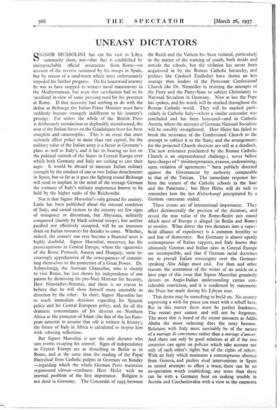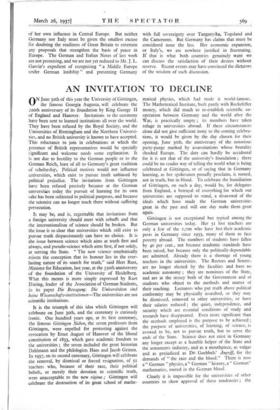UNEASY DICTATORS
SIGNOR MUSSOLINI has cut his visit to Libya summarily short, not—that fact is established by unimpeachable official assurances from Rome—on account of the reverse sustained by his troops in Spain, but by reason of a sandstorm which most unfortunately impeded his further progress. On his homeward journey he was to have stopped to witness naval manoeuvres in the Mediterranean, but even that satisfaction had to be sacrificed in view of some pressing need for his presence at Rome. If that necessity had nothing to do with the defeat at Brihuega the Italian Prime Minister must have suddenly become strangely indifferent to his country's prestige. For unless the whole of the British Press it deliberately mendacious or deplorably misinformed, the rout of the Italian forces on the Guadalajara front has been complete and catastrophic. This is an event that must seriously affect policy in more than one capital, for the military value of the Italian army is a factor in Germany's plans as well as Italy's, and it has its bearing no less on the political outlook of the States in Central Europe over which both Germany and Italy are seeking to cast their aegis. It would be absurd to measure Italian military strength by the conduct of one or two Italian detachments in Spain, but so far as it goes the fighting round Brihuega will tend to implant in the mind of the average German the estimate of Italy's military importance known to be held by the higher ranks of the Reichswehr.
Nor is that Signor Mussolini's only ground for anxiety. Little has been published about the internal condition of Italy, and casual visitors to the country see few signs of stringency or discontent, but Abyssinia, militarily conquered (mainly by black colonial troops), but neither pacified nor effectively occupied, will be an immense drain on Italian resources for decades to come. Whether, indeed, the country can ever become a financial asset is highly doubtful. Signor Mussolini, moreover, has his preoccupations in Central Europe, where the signatories of the Rome Protocol, Austria and Hungary, seem in- creasingly apprehensive of the consequences of commit- ting themselves to the protection of a Great Power. Dr. Schuschnigg, the Austrian Chancellor, who is shortly to visit Rome, has just shown his independence of one patron by dismissing his pro-Nazi Minister for Security, Herr Neustadter-Stiirmer, and there is no reason to believe that he will show himself more amenable to direction by the other. In short, Signor Mussolini has to reach immediate decisions regarding his Spanish policy and his Central European policy, and, for all the dramatic concomitants of his descent on - Northern Africa as the protector of Islam (the fate of the last Euro- pean autocrat to assume that role is written in history), the future of Italy in Africa is calculated to inspire him with sobering reflections.
But Signor Mussolini is not the only dictator who sees events escaping his control. Signs of independence in Central Europe are as disturbing to Berlin as to Rome, and at the same time the reading of the Papal Encyclical from Catholic pulpits in Germany on Sunday —regarding which the whole German Press maintains regimented silence—confronts Herr Hider with an internal problem of the first importance. Religion is not dead in Germany. The Concordat of 1933 between the Reich and the Vatican has been violated, particularly in the matter of the training of youth, both inside and outside the schools, but the violation has never been acquiesced in by the Roman Catholic hierarchy,. and prelates like Cardinal Faulhaber have shown no less courage than leaders of the Protestant Confessional Church like Dr. Niemoller in resisting the attempts of the Party and the Party-State to subject Christianity to National Socialism in Germany. Now at last the Pope has spoken, and his words will be marked throughout the Roman Catholic world. They will be marked parti- cularly in Catholic Italy—where a similar concordat was concluded and has been honoured—and in Catholic Austria, where the mistrust of German National SocialiSm will be sensibly strengthened. Herr Hitler has failed to break the resistance of the Confessional Church to the attempt to subject it to the State, and the arrangements for the projected Church elections are still at a deadlock. The new resistance proclaimed by the Roman Catholic Church is an unprecedented challenge ; never before have charges of" misinterpretation, evasion, undermining, open violation of agreements " been publicly directed against the Government by authority comparable to that of the Vatican. The immediate response has been the seizure of the Catholic schools in the Saar and the Palatinate ; but Herr Hitler will do well to remember how the last Kulturkampf precipitated by a German statesman ended.
These events are of international importance. They affect detrimentally the position of the dictators, and reveal the true value of the Rome-Berlin axis round which most of Europe is alleged (in Berlin and Rome) to revolve. What drives the two dictators into a super- ficial alliance of expediency is a common hostility to and fear of democracy. But Germany is almost openly contemptuous of Italian support, and Italy knows that ultimately German and Italian aims in Central Europe are incompatible, and that if German racial doctrines are to prevail Italian sovereignty over the German- speaking Alto Adige must end. For than and other reasons the contention of the writer of an article on a later page of this issue that Signor Mussolini genuinely desires an Anglo-Italian understanding carries con- siderable conviction, and it is confirmed by statements the Duce has made during his Libyan tour.
That desire may be something to build on. No country expressing a wish for peace can meet with a rebuff here. But in this matter there must be perfect frankness. The recent past cannot and will not be forgotten. The more that is heard of the recent massacre at Addis Ababa the more sickening does the story become. Relations with Italy must inevitably be of the nature of a manage de conversance rather than a manage d'amour, And there can only be good relations at all if the two countries can agree on policies which take account not only of each other's rights but of the rights of others. With an Italy which maintains a contemptuous absence from Geneva, and prefers rival interventions in Spain to united attempts to effect a truce, there can be no co-operation worth establishing, any more than there Can be with a Germany bent on making trouble in Austria and Czechoslovakia with a view to the extension of her own influence in Central Europe. But neither Germany nor Italy must be given the smallest excuse for doubting the readiness of Great Britain to entertain any proposals that strengthen the basis of peace in Europe. The German and Italian Notes of last week are not promising, and we are not yet reduced to Mr. J. L. Garvin's expedient of recognising " a Middle Europe under German lordship " and presenting Germany with full sovereignty over Tanganyika, Togoland and the Cameroons. But Germany has claims that must be considered none the less. Her economic expansion, or Italy's, we are nowhere justified in frustrating. If that is what both countries genuinely want we can discuss the satisfaction of their desires without reserve. Recent events may have convinced the dictators of the wisdom of such discussion.











































 Previous page
Previous page